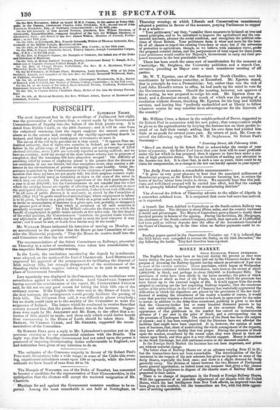The Marquis of Worcester, son of the Duke of Beaufort,
has consented to beceme a candidate for the representation of East Gloucestershire, in the anticipation that the electors will accept the tendered resignation of Mr. Charteris.
' Meetings for and against the Government measure continue to be re.. ported. Among the most remarkable is one held at Nottingham, on Thursday evening; at which Liberals and Conservatives unanimously adopted a petition in favour of the measure, praying Parliament to supper it as a whole- " Your petitioners," say they, "consider these measures to be based on true and sound principles, and to be calculated to improve the agricultural and the corn mereial interests, advance the social condition, and strengthen the political rela- tions of Great Britain. Your petitioners deem it wiser and more for the bene-
fit of all classes to repeal the existing Corn-laws at once; but if the advocates of protection to agriculture, though, as we believe, with mistaken views, prefer the proposed reduced duties, and the postponement of total repeal for three years, your petitioners would confine her Majesty's Government to carry out their pro- posed measures in the best practicable mode."
There has been much the same sort of manifestation for the measure at Cambridge; Mr. Deighton, the University publisher, and a stanch Con. servative, presiding as Mayor over a most unanimous meeting of all parties.
Mr. W. T. Egerton, one of the Members for North Cheshire, met his constituents by invitation yesterday, at linutsforcl. Mr. Egerton stated, that in principle he was a Protectionist; but, rather than run the risk of Lord John Russell's return to office, he had made up his mind to vote for the Government measures. Should the meeting, however, not approve of his so acting, he was prepared to resign his seat. Mr. Egerton then re- tired; and a discussion ensued, the result of which was the passing of a resolution without dissent, thanking Mr. Egerton for his long and faithful services, and leaving him "perfectly unshackled and at liberty to follow whatever course he may consider most advantageous for the interests of the country."


























 Previous page
Previous page